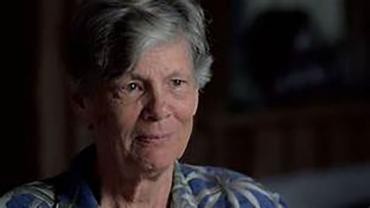
Environmentalist Maggy Hurchalla's day in court Wednesday was a day of tired adages, conflicting opinions, and "blurry lines" between federal and state laws on protected speech.
She held court among a throng of supporters in the courthouse lobby of the Fourth District Court of Appeal in West Palm Beach, convinced that her First Amendment rights would set her free from a Martin County Circuit Court jury's nearly $4.4 million judgment against her for interfering in a business contract.
Supporters wore tiny campaign buttons depicting a silhouette of Hurchalla, 78, in a kayak holding an oar with both hands overhead in triumph.
Inside the courtroom, the questions from the panel of three judges, Burton C. Conner, Dorian K. Damoorgian and Alan O. Forst, split judicial hairs over the interpretation of the lower court's jury instructions.
-
Did Circuit Court Judge William A. Roby properly apply federal law and state common law when he instructed the jury that they could decide if Hurchalla's actions were proper or improper, thus inferring intent?
-
Did trial testimony prove that Hurchalla's actions demonstrated expressed or implied malice, which would undercut her First Amendment defense, or no malice at all?
-
Did Hurchalla intend to harm Lake Point as her sole motivation, or was it primary among other reasons, or was the harm, if any, unanticipated?
The questions from the three-judge panel balanced the interests of both sides, taking the opposing counsel's viewpoint, as they examined the legal -- or flawed -- basis for the jury to infer malicious intent on Hurchalla's part due to her use of improper methods.
The jury's conclusion led to its decision to award damages to Lake Point, a decision subsequently appealed.
THE LAKE POINT RESTORATION PROJECT
Lake Point Restoration had purchased about 2,000 acres of land in western Martin County in 2008, half was an ongoing housing development on 20-acre lots and the other was farmland and cow pasture with the intent to convert the development into a rock mine and water restoration project.
The parcels were strategically located near Lake Okeechobee, between the C-44 canal that discharges polluted water to the St. Lucie River to the north and the L-8 canal to the south.
The company entered into an agreement in 2008 with the South Florida Water Management District, which signed an interlocal agreement in 2009 with the Martin County Commission, to recognize Lake Point as a public works project if Lake Point was successful in obtaining proper permits from the U.S. Army Corps of Engineers, the Florida Department of Environmental Protection, and the South Florida Water Management District.
After Lake Point successfully obtained all applicable permits and applied in 2012 to have the county revoke the housing development order, as required by the interlocal agreement, the county commission refused to do so. They would not recognize Lake Point's standing as a public works project, and returned Lake Point's $45,000 check, uncashed, as payment of its environmental fee.
In fact, the commission ordered code enforcement action against Lake Point in 2013, not as a rock mine, but as a housing development, after Hurchalla determined that the company had changed its environmental objectives, which led to Lake Point lawsuits against Martin County, the SFWMD and Hurchalla.
Lake Point representatives had approached West Palm Beach during a public meeting about paying for excess water from the C-44 canal, cleansed on its property, to supplement the drought-stricken city's water supply, which Hurchalla's attorney claimed had been a secret plan.
According to civil court testimony, that initiative had been part of the original plan, although a contract outlining specifics was awaiting the development of a market and a SFWMD permit. The agreement was crafted to ensure that Lake Point could earn a return over 20 years on its $50 million investment by any legal means and without interference by the county or state, prior to donating 1,800 acres to the state, including all of the stormwater treatment areas constructed by Lake Point.
HURCHALLA'S DEFENSE
Hurchalla's new defense team, led by Talbot “Sandy” D'Alemberte, president emeritus of FSU and former dean of the FSU law school, argued that Hurchalla, an acknowledged and widely recognized environmentalist, enjoyed “protected privilege” as a US citizen and Florida resident petitioning her county commission to address concerns about the environmental impact of the Lake Point project.

D'Alemberte argued that Hurchalla had been “unaware of any misstatements,” harbored no malice toward the business, that she is allowed to express her opinion, that she is not responsible for missteps by government officials, and that the contract was never breached, since it remains in force.
He proposed that Roby should have stopped the case from going to the jury to impose his own ruling, called a directed verdict, because, he said, Lake Point had not presented a preponderance of evidence that malicious intent was Hurchalla's sole or primary motivation, the only exception to free speech protection.
LAKE POINT'S ARGUMENTS
Conner suggested that perhaps Hurchalla's misstatements were the result of “negligent investigation,” a notion vigorously rejected by Lake Point attorney Jon Tasso. He pointed to Hurchalla's persistent claims that wetlands had been destroyed – “she pounded that drum for weeks and weeks” – despite the testimony of the county's Growth Management Department and SFWMD experts that no wetlands had been destroyed, had been a deliberate attempt to turn public opinion and the county commission against Lake Point.
Tasso called her actions “absolutely reckless.” He also rejected D'Alemberte's characterization of Hurchalla's communications with commissioners as merely her opinion.
“She was making these statements as factual assertions,” Tasso said, “not opinion.”
Her influence was persuasive, since the three commissioners who comprised the majority at the time, Sarah Heard, Ed Fielding and Anne Scott, all admitted during previous trial testimony that they had not read any of the permits or any of the Lake Point agreements.
“Their only source of information,” he added, “was Maggy Hurchalla.”
The bulk of the email correspondence between Hurchalla and the private email accounts of the three commissioners no longer exists, thus the direct evidence of malice that might have been revealed in private correspondence is unavailable to the court.
“They covered their tracks,” Tasso said, by deleting emails, which Hurchalla claims were not related to Lake Point. Since only the emails themselves, which no longer exist, can verify that the emails are material to the case, the jury was allowed to decide if they were or were not relevant.
A handful of recovered emails showed Hurchalla giving specific steps to then-Commissioner Fielding, “Don't worry about the money. Don't worry about the environment. Just cancel the contract,” steps which Fielding followed.
Hurchalla also signed emails as Mrs. Machiavelli, a name taken from the infamous Italian philosopher who wrote a political treatise in the 1500s advocating “the ends justifies the means” behavior, acting without a moral code, especially among politicians seeking power.
“She self-described herself as Mrs. Machiavelli,” Tasso said. “Lake Point did not call her that.”
THE JUDGES' DECISION
Damoorgian, the presiding judge, commented that Hurchalla's arguments during the civil trial and even written in the motion for summary judgment had “blurred the lines” between meeting federal standards to establish malice, and those required by state common law, thus opening the judge's instructions to the jurors to errors. No clear path to the panel's decision, which can take weeks or months, was evident at the end of the hour-long proceeding.
Barbara Clowdus, editor and publisher of Martin County Currents, has covered the Lake Point case from the beginning.


